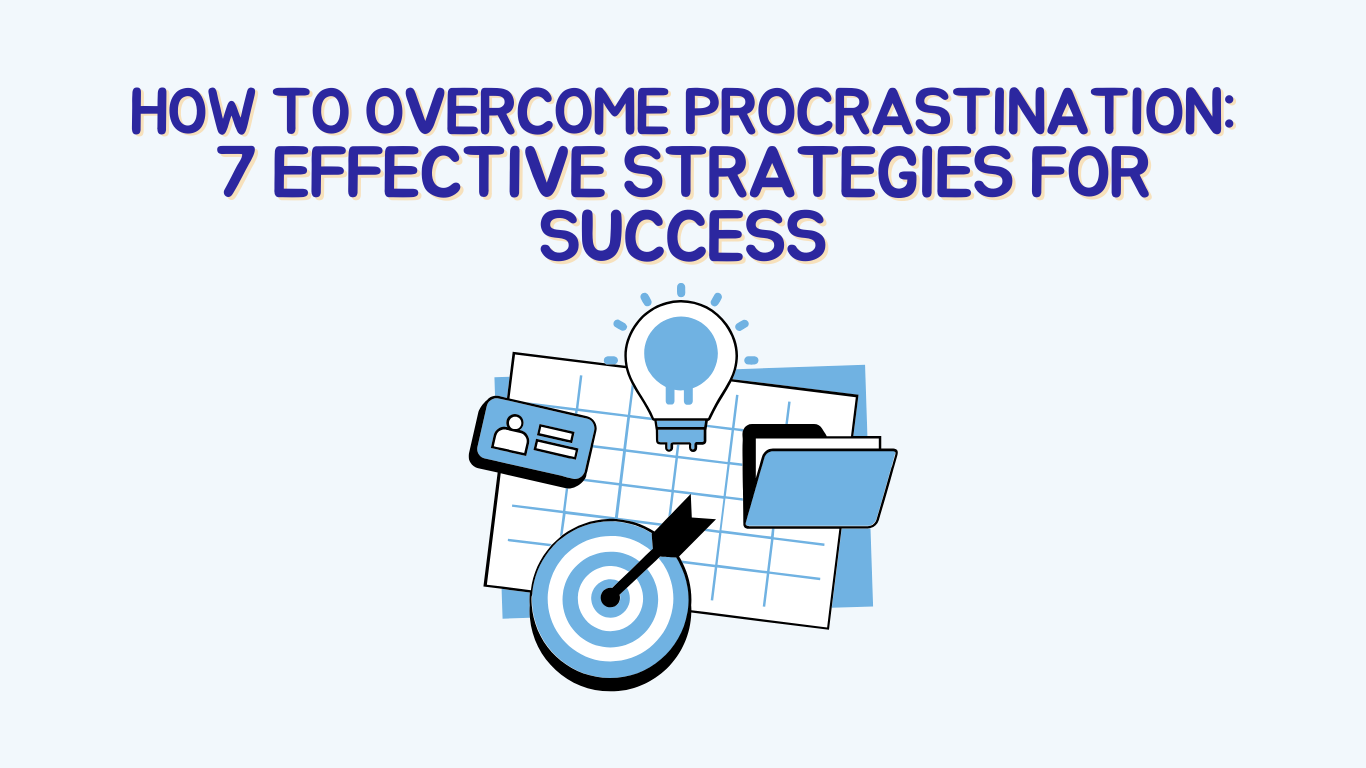Can’t seem to stop putting things off? You’re not alone—procrastination is a challenge we all face at some point. But the good news? Breaking free from the cycle of delay is totally possible.
In this article, we’ll dive into seven practical strategies to help you beat procrastination and boost your productivity. You’ll uncover the hidden reasons behind why we procrastinate, learn how to manage your time more effectively, and discover simple but powerful techniques to stay on track. If you’re ready to stop stalling and start achieving, let’s get to it!

Key Takeaways
- Procrastination often stems from emotional fears, like the fear of failure, rather than just laziness, making it important to address these underlying psychological issues.
- Implementing effective time management techniques, like setting realistic goals and organizing tasks, can greatly reduce procrastination and enhance productivity.
- Creating an optimal workspace by minimizing distractions and adding personal touches can support better focus and motivation, helping you overcome procrastination.

Understanding Why People Procrastinate
Procrastination is often misunderstood as mere laziness, but in reality, it is driven by complex psychological reasons. A significant factor is the fear of failure, which can inhibit decision-making and halt task initiation. This fear creates a cycle where people procrastination avoid tasks to escape the emotional discomfort associated with potential failure, leading to chronic procrastination.
The procrastination cycle is further fueled by the avoidance of confronting these negative emotions. Instead of addressing the root cause, individuals often find themselves trapped in a loop of delaying tasks, which only intensifies the fear and anxiety over time. Understanding these psychological triggers is the first step towards overcoming procrastination.
Recognizing that procrastination stems from deeper emotional responses rather than a lack of effort allows you to address these issues directly. This understanding paves the way for implementing practical strategies that can help you break free from the procrastination cycle.

Recognizing Negative Self Talk
Negative self-talk is a significant contributor to procrastination. Emotions like anxiety and depression can lead individuals to avoid tasks. When you constantly tell yourself that you’re not good enough or that you’ll fail, you begin to believe it, leading to negative feelings of inadequacy and reduced motivation.
Perfectionism is another form of negative self-talk that exacerbates procrastination. Setting unrealistic expectations and unrealistically high standards can paralyze you from starting or completing tasks because you’re afraid of not meeting those expectations. This fear of imperfection leads to avoidance and further procrastination.
Low self-esteem also plays a role. When you doubt your abilities, it becomes easier to put off tasks rather than face the possibility of failure. Additionally, rumination, or the repetitive negative thoughts about past failures, can significantly contribute to procrastination.
To combat negative self-talk, it’s essential to practice self-compassion and accept that failure is a normal part of the process.
Here are some key points to consider:
- Acknowledge your humanity
- Approach your thoughts and feelings without judgment
- Foster resilience
- Mitigate the effects of negative repetitive thoughts
- Stay motivated and focused
By implementing these strategies, you can cultivate a healthier mindset.

Effective Time Management Techniques
Effective time management techniques are crucial in the battle against procrastination. Utilizing a planner to schedule assignments and breaks can significantly enhance your time organization. Setting alarms to remind you to check your planner and stay on track is another practical tip.
Identifying your personal peak productivity times can help optimize your study or work schedule. By tackling important tasks during these periods, you can make the most of your energy and focus. Prioritizing urgent tasks can prevent last-minute stress and improve task completion rates.
Scheduling regular breaks during study or work sessions can boost overall productivity and energy levels. Establishing a daily routine provides structure and helps maintain focus on tasks, making it easier to avoid procrastination.
Incorporating these strategies into your daily life can help you stay on top of your responsibilities and reduce the temptation to procrastinate. Effective time management fosters a more productive and less stressful environment.

Setting Realistic Goals
Setting realistic goals is a key factor in overcoming procrastination. Achieving goals and changing habits takes time and effort, so it’s essential to focus on productive reasons for doing a task and set concrete, meaningful goals. Writing down your specific goals increases motivation by providing a clear target to aim for.
Establishing daily goals helps prioritize tasks and can lead to lower anxiety and improved focus. For instance, rather than setting a vague goal like “study more,” specify it as “dedicate 30 minutes to studying biology each day.”
Assigning achievable deadlines to tasks enhances accountability and fosters a sense of accomplishment. However, it’s also an important task to adjust deadlines when life demands change to maintain commitment without feeling defeated. This flexibility ensures that you stay on track without becoming overwhelmed.
Setting realistic and specific goals creates an achievable and motivating roadmap for success. This approach helps you stay focused and reduces the likelihood of procrastination.

Staying Motivated and Focused
Setting clear goals provides direction and a sense of purpose, which are key to maintaining motivation. One effective strategy is the ‘5-minute rule,’ which encourages you to start tasks with a commitment of just five minutes. Most people continue to work after the time is up, as the initial barrier is overcome.
Rewarding yourself after completing tasks can serve as additional motivation. Whether it’s a small treat or a break to do something you enjoy, these rewards can help keep you motivated to complete your important tasks. A study partner can also provide accountability and assistance in staying on task.
Setting clear boundaries between work and personal time is crucial, especially in remote settings. This separation helps maintain focus and prevents burnout. Engaging in enjoyable activities can effectively reduce stress, thereby improving concentration and motivation.
Implementing these strategies helps maintain motivation and focus on your goals, reducing procrastination. Maintaining a balance between work and relaxation ensures that you remain productive without feeling overwhelmed.

Breaking the Procrastination Cycle
Breaking the procrastination cycle involves practical steps to make a big task more manageable. One effective approach is to stop procrastinating by breaking larger projects into smaller, more manageable segments. This method reduces the feeling of being overwhelmed and makes the overall objective feel less daunting.
Short breaks during study or work sessions enhance focus and reduce fatigue. The Pomodoro Technique, which involves working for 25 minutes and then taking a 5-minute break, is a popular and effective method for maintaining concentration and productivity.
Practical steps to begin tasks, such as the ‘5-minute rule,’ can help overcome the initial resistance to starting. Committing to just a few minutes of work often builds momentum, breaking the cycle of procrastination. These strategies can help you stay motivated and make consistent progress towards your goals.

Creating an Optimal Environment
Creating an optimal environment is crucial for productivity and reducing procrastination. Here are some strategies to consider:
- Minimize distractions by turning off notifications.
- Use noise-canceling headphones to enhance concentration while working on tasks.
- Regularly declutter your digital files to maintain mental clarity and reduce distractions.
By implementing these strategies, you can create a more productive workspace.
An organized workspace, where everything is easily accessible, can save time and enhance efficiency. Implementing a cable management system can reduce visual clutter and prevent damage to cables. Personal touches, like plants or artwork, can foster a positive atmosphere that inspires creativity.
Ergonomically designing your workspace can enhance comfort and reduce fatigue, leading to improved productivity. Natural sunlight can significantly elevate mood and energy levels, positively affecting work performance. Creating an optimal environment sets you up for success and reduces procrastination.

How Accountability Partners Can Help Overcome Procrastination
Accountability partners can play a vital role in overcoming procrastination. These partners provide essential support, helping individuals commit to their goals and stay focused. Accountability partnerships can be structured as one-way or two-way relationships, depending on how both parties engage.
Effective accountability partnerships often involve regular meetings to discuss progress and strategies. Choosing an accountability partner who shares similar interests can lead to better support and understanding. Setting specific, measurable goals is crucial for these partnerships to ensure both parties remain focused.
A trial period is beneficial for evaluating compatibility and communication styles before committing to a long-term partnership. Common challenges in these partnerships include finding the right fit and maintaining consistent communication. Establishing a regular schedule for check-ins can help ensure accountability and progress toward shared goals.

Summary
Overcoming procrastination requires a multifaceted approach that addresses both psychological and practical aspects. By understanding why people procrastinate, recognizing negative self-talk, and implementing effective time management techniques, you can break the procrastination cycle.
Setting realistic goals, staying motivated, and creating an optimal environment further support your journey towards productivity.
Accountability partners can provide the necessary support and motivation to stay on track. By incorporating these strategies into your daily life, you can achieve your goals and enjoy a more productive and fulfilling life.
Remember, overcoming procrastination is a continuous process, but with the right tools and mindset, you can succeed.

Frequently Asked Questions
Why do people procrastinate?
People often procrastinate due to psychological factors like fear of failure and negative self-talk, not just because they’re lazy. Understanding this can help in tackling procrastination more effectively.
How can time management techniques help overcome procrastination?
Time management techniques like planners and setting alarms can really keep you organized and focused, making it easier to overcome procrastination. By identifying your peak productivity times, you can tackle tasks when you’re most alert and motivated.
What role do realistic goals play in avoiding procrastination?
Realistic goals help you break tasks down into manageable steps, which can reduce anxiety and boost your motivation. This clarity makes it much easier to stay on track and avoid procrastination.
How can accountability partners help in overcoming procrastination?
Having an accountability partner can really help you beat procrastination by providing that extra push and motivation you need. They keep you focused on your goals with regular check-ins, making it easier to stay on track.
What are some strategies to create an optimal environment for productivity?
Creating an optimal environment for productivity comes down to minimizing distractions and organizing your workspace. Add personal touches and ensure ergonomic design to boost your concentration and keep procrastination at bay.

